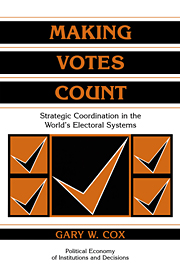Book contents
- Frontmatter
- Contents
- List of tables and figures
- Series Editors' Preface
- Preface
- PART I INTRODUCTION
- PART II STRATEGIC VOTING
- PART III STRATEGIC ENTRY
- PART IV ELECTORAL COORDINATION AT THE SYSTEM LEVEL
- PART V COORDINATION FAILURES AND DEMOCRATIC PERFORMANCE
- PART VI CONCLUSION
- 15 Conclusion
- APPENDICES
- References
- Subject Index
- Author Index
15 - Conclusion
Published online by Cambridge University Press: 05 August 2012
- Frontmatter
- Contents
- List of tables and figures
- Series Editors' Preface
- Preface
- PART I INTRODUCTION
- PART II STRATEGIC VOTING
- PART III STRATEGIC ENTRY
- PART IV ELECTORAL COORDINATION AT THE SYSTEM LEVEL
- PART V COORDINATION FAILURES AND DEMOCRATIC PERFORMANCE
- PART VI CONCLUSION
- 15 Conclusion
- APPENDICES
- References
- Subject Index
- Author Index
Summary
In a world without transaction costs, democratic politics is inherently unstable. There is always another deal that might be offered to a majority coalition comprising some current winners and some current losers, which makes all members of that coalition better off. But typically there are lots of new deals that can beat the old deal, and people will differ over which of them is best. If only a few voters “defect” from the current political equilibrium and vote for a new party or policy, the old equilibrium will be undisturbed. In order for a new deal to come about, it takes the coordinated actions of large numbers of politicians and voters. Thus, the inherent instability of politics implies that coordination problems will be omnipresent.
One way to think of the problem of democratic coordination dealt with in this book is in terms of a sequence of choices whereby a government is chosen from the mass of citizens. In a stylized parliamentary system, the sequence includes a procedure to decide which citizens will appear on the ballot as candidates, then a procedure to decide which candidates will be elected to serve in parliament, then a procedure to decide which MPs will form the government. At each of these stages, there may be more people of a given ideology or type seeking a spot on the ballot, a seat in the legislature, or a portfolio in the government than there are spots, seats, or portfolios to be had.
- Type
- Chapter
- Information
- Making Votes CountStrategic Coordination in the World's Electoral Systems, pp. 269 - 278Publisher: Cambridge University PressPrint publication year: 1997



